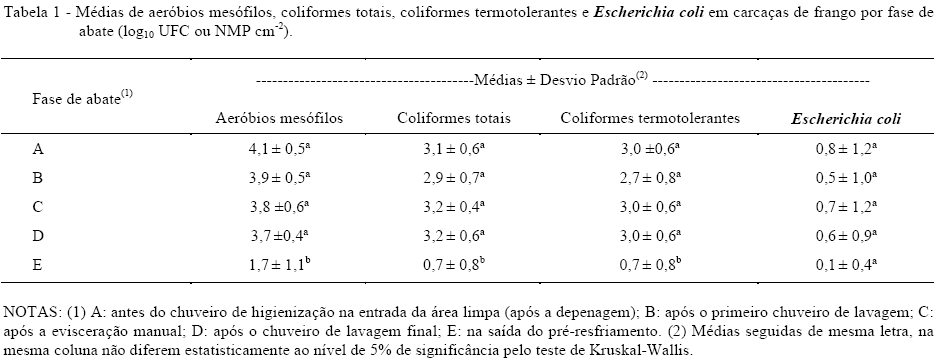Hygiene indicator microorganisms in a poultry slaughter was evaluated during the processing in order to identify potential critical control points and allow options for monitoring or verification by Hazard Analysis Critical Control Point (HACCP) system. Microbiological superficial contamination of chicken carcasses was establish by the enumeration of mesophilic aerobes, total coliforms, thermotolerant coliforms and Escherichia coli in the following steps of processing: A - before the first hygienic shower, B - after the first hygienic shower, C - after manual evisceration, D - after final washing shower, and E - after the chiller tank. The mean counts of mesophilic aerobes, total and thermotolerant coliforms was not significantly different (P<0.05) in the steps A, B, C and D. However, the mean values of these microorganisms in step E (after chilling) was significantly lower when compared to the one obtained in the other steps. The mean counts of Escherichia coli were not significantly different, independently of the processing step analyzed. The chances of contamination were estimated by Odds Ration, and it was observed that chances were higher in the step A for mesophilic aerobes, and in the step C for coliforms. Considering the analyzed parameters, the levels of contamination by mesophilic aerobes, total and thermotolerant coliforms were the most suitable for monitoring and verification of a HACCP system in a poultry processing plant. The obtained results indicate that the chilling can be considered as an important critical control point, once this procedure was able to reduce significantly the microbiological contamination.
mesophilic aerobes; coliforms; poultry slaughter; HACCP

 Analysis and monitoring of critical points in the poultry slaughter using microbiological indicators
Analysis and monitoring of critical points in the poultry slaughter using microbiological indicators
